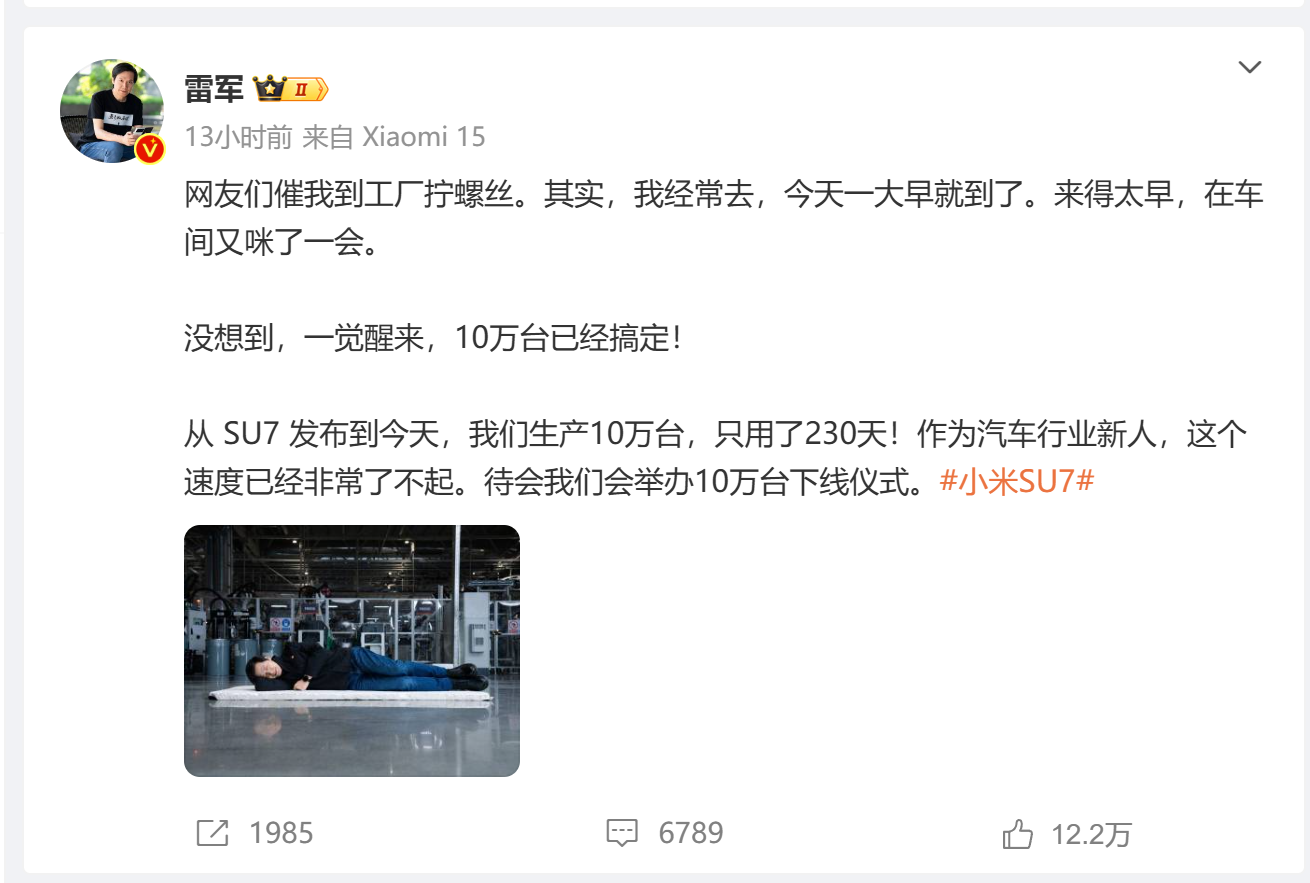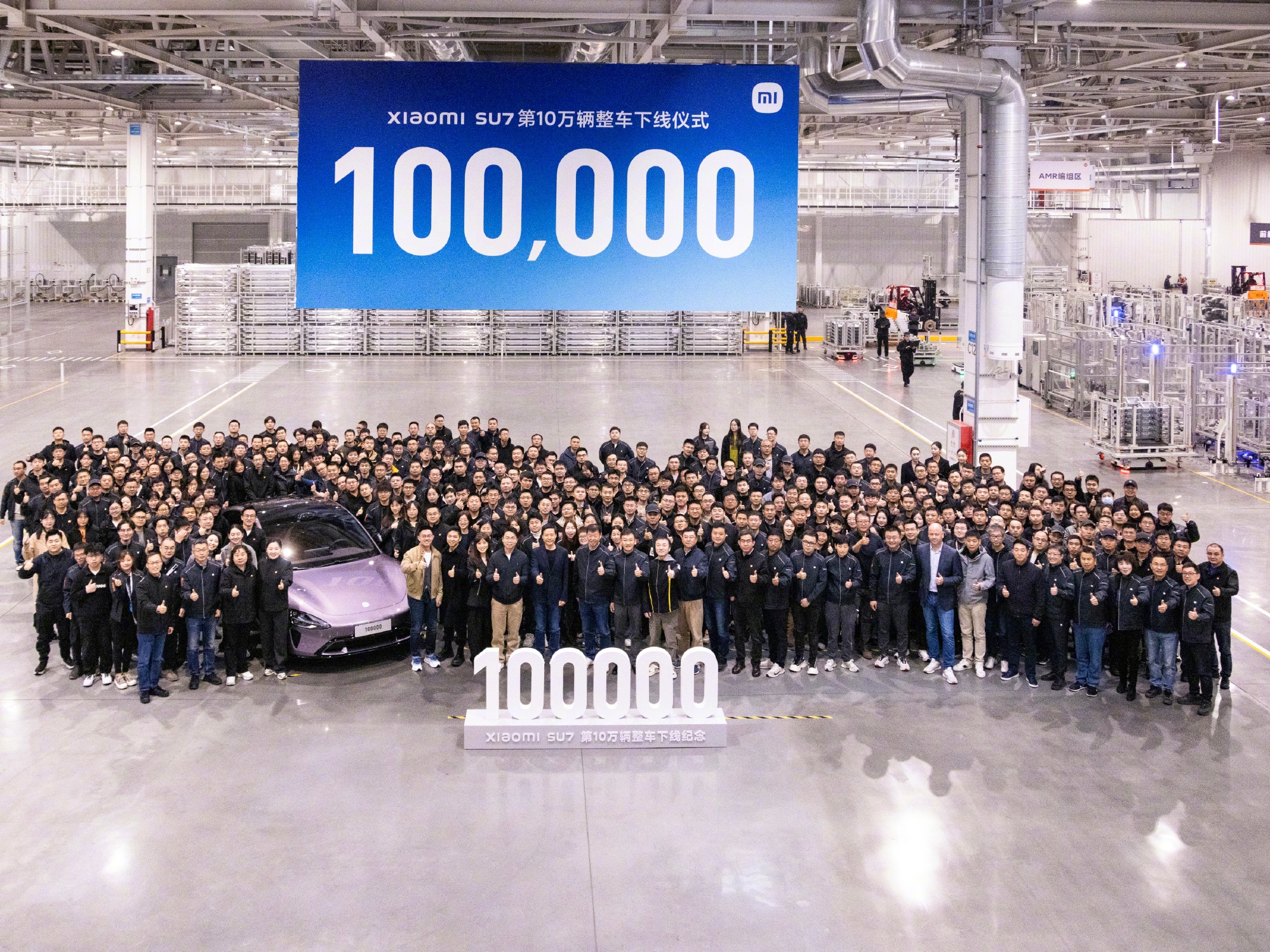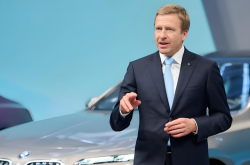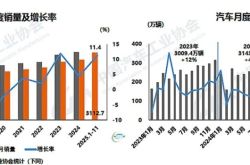The 100,000th Xiaomi SU7 rolls off the production line! Has Xiaomi Automobile become a major auto manufacturer?
![]() 11/14 2024
11/14 2024
![]() 679
679
Before 8 AM on November 13, Lei Jun posted a Weibo update with a photo of himself "sleeping" in a Xiaomi factory.
"Netizens urged me to go to the factory to tighten screws. In fact, I often go, and I arrived early this morning. I arrived too early, so I took a nap in the workshop."

(Image from Weibo)
Besides going to the factory to tighten screws, Lei Jun also brought good news—the 100,000th Xiaomi car has rolled off the production line. That's right, while Lei Jun was sleeping, Xiaomi SU7 surpassed 100,000 units, prompting many netizens to joke that "Lei Jun did nothing but still won big."
Exactly 230 days ago was the launch of Xiaomi Automobile SU7. In less than a year, it achieved the milestone of 100,000 units with a single model. According to Xiaomi's plan to deliver at least 100,000 units this year and aim for 120,000, the minimum target has already been met, and overachieving in the next two months seems almost certain.
The news that "Lei Jun actually went to tighten screws" and that Xiaomi Automobile's production has reached 100,000 units has attracted much attention, drawing blessings and imitation from competitors. For example, XPeng and BYD congratulated Xiaomi Automobile, and Wuling's brand manager Zhou Jinkai even took a photo of himself lying in the workshop to celebrate Wuling's 30 millionth car rolling off the production line.
That said, how close is Xiaomi Automobile's rapid growth to becoming a mainstream major manufacturer?
Rolling off 100,000 units in half a year, Xiaomi Automobile becomes a major manufacturer
Achieving the milestone of the 100,000th new car in 230 days, Xiaomi Automobile has set a new record for the fastest rollout of 100,000 units by a new automaker. Lei Jun has fulfilled the "flag" he set at the Xiaomi SU7 launch event, but Xiaomi Automobile has faced continuous controversy along the way.
Perhaps Xiaomi Automobile underestimated the market response. Orders for Xiaomi SU7 exceeded 100,000 within a month of its launch and may have reached 200,000 by now. The rated capacity of Xiaomi Automobile's Phase I factory is 150,000 units, and the Phase II factory has not yet commenced production, meaning the Phase I factory is operating beyond capacity, making it challenging to fulfill these orders.
Before Xiaomi Automobile upgraded its production lines, sales in April and May barely exceeded 10,000 units per month.
The automotive market is fiercely competitive, and consumers have limited patience for waiting. If new cars cannot be delivered for an extended period, customers may switch to competitors. Some brands even offer "deposit subsidies" to attract customers. Despite some cancellations due to impatience or unsuitability, Xiaomi SU7 has not seen a large-scale wave of cancellations.
In June this year, Xiaomi Automobile's factory began double-shift production, increasing monthly deliveries to 10,000 units. At the time, Lei Jun stated that Xiaomi Automobile would complete its annual delivery plan of 100,000 units ahead of schedule in November. Earlier, Wall Street CN obtained information from the supply chain that Xiaomi Automobile had asked upstream suppliers to increase component supplies. After about six months of ramping up production capacity, Xiaomi Automobile has fulfilled Lei Jun's promise at the time, with monthly deliveries exceeding 20,000 units, significantly reducing the number of critics who had previously doubted Xiaomi Automobile.

(Image from Xiaomi Automobile)
What does it mean to achieve the rollout of 100,000 new cars in less than a year? This is generally only achievable by "major manufacturers" with a mature industrial scale. The Lixiang L6, launched on April 18 this year, achieved deliveries exceeding 150,000 units in just seven months. As a first-year crossover automaker, Xiaomi Automobile's production capacity has reached the level of major manufacturers, a remarkable achievement.
However, it's important to note that Xiaomi Automobile currently only has one model, and orders continue to pour in. According to Car Fans, Xiaomi SU7 had an additional 5,000 locked orders last week. At this rate, Lei Jun may find himself "delivering more but owing more." While strong sales are good news, how will Xiaomi Automobile manage this growing brand influence?
Solving capacity issues cannot rely solely on Lei Jun "tightening screws"
Whether it's brand value, product positioning, or marketing strategy, Xiaomi's success is evident in the rollout of 100,000 units. The popularity of the all-electric SU7 and the brand's influence have played a significant role. Additionally, Lei Jun's various actions have brought considerable marketing effects, such as opening car doors for owners at delivery ceremonies and today's "workshop nap," which has inspired imitation by competitor executives, hoping to create a perception of high demand for Xiaomi Automobile.
The influx of numerous orders has become a "sweet problem" for Xiaomi Automobile.
In terms of deliveries, Xiaomi quickly adjusted its production rhythm, fulfilling its promise in less than half a year. However, based on the production capacity of Xiaomi Automobile's Phase I factory, the annual rated capacity is 150,000 units, equivalent to a monthly rated output of 12,500 units. To reach a monthly delivery target of 24,000 units, Xiaomi Automobile's factory utilization has nearly doubled. Even with double shifts, Xiaomi Automobile's current capacity cannot fully digest orders in the short term.
Moreover, this is only for the SU7 model. With the strong demand for Xiaomi SU7 Ultra and the upcoming Xiaomi SUV, the progress of subsequent models may have to be slowed down if deliveries are not ideal. Tesla has also experienced a "production hell," which not only significantly extended new car delivery timelines but also led to abnormal premiums in the used car market.
The only way to alleviate pressure on automobile production is through more efficient production lines and additional factories. It is reported that Xiaomi Automobile's Phase II factory is already under construction and is expected to be completed in June 2025. After passing Xiaomi's inspection and local government verification, it is expected to commence production in July or August at the earliest.
With both factories accelerating production, Xiaomi Automobile's rated annual production capacity can reach 300,000 units. If both factories operate on double shifts, the annual production capacity after "overclocking" may reach 600,000 units. It's important to note that Xiaomi Automobile cannot rely solely on one model. After establishing its reputation with the SU7, the upcoming Xiaomi SUV will target a broader mainstream market, making production capacity essential.
It is certain that the supply and demand for Xiaomi SU7 are not balanced, with production lagging behind demand, leading to a situation where "the more delivered, the more owed." Before the second factory commences production, the Phase I factory will be the sole production pillar. While relying on double shifts is not ideal, it is at least crucial for ensuring consumers can receive their cars earlier.
In previous years, Xiaomi phones were in high demand, often leading to stockouts. Netizens then urged Lei Jun to go to the factory to tighten screws. Now that Xiaomi Automobile is in high demand, Lei Jun has once again picked up a screwdriver to join the factory workers. It's undeniable that executives joining the factory floor to tighten screws has a significant motivational effect on netizens, as it's something they enjoy seeing. However, Electric Vehicle News believes that this is more of a well-known meme, providing emotional value by showing that Xiaomi is working hard together with everyone, but it has little impact on actual production outcomes.
Xiaomi Automobile has no worries about sales; the key is having cars to deliver
Three years ago, Tesla was struggling with the pandemic and insufficient production capacity, facing difficulties in delivering new cars. Three years later, there are six factories serving Tesla, five of which are Gigafactories with an annual production capacity of approximately 1.8 million units. These factories have solved Tesla's supply issues and laid the foundation for future new models, especially the global rollout of the Cybertruck.
Like Tesla, Xiaomi has built a successful brand, and new cars are not a concern for sales. This means that the only remaining challenge for Xiaomi Automobile is production capacity.
According to Xiaomi Automobile's plans, the next model to be released will be a pure electric SUV, with the possibility of an extended-range product in the future. Tesla currently relies on the Model Y for its sales, and Electric Vehicle News believes that Xiaomi's second model will be the true beginning of a sales explosion. Having learned from the early delivery issues with the SU7, Xiaomi Automobile now has more experience in product planning and production rhythm, leading to more mature delivery control.

(Image from Xiaomi Automobile)
Ramping up automotive production capacity is a process of acceleration. The first 100,000 units took 230 days, and the next 100,000 units will undoubtedly take less time.
Next, Xiaomi will also need to handle deliveries of the SU7 Ultra. Although it is not a high-volume product, according to official news, 3,680 people placed orders within the first 10 minutes of pre-orders opening. As the SU7 Ultra that successfully conquered the Nürburgring, the production version comes with even more accolades, and with the influence of Lei Jun and Xiaomi, sales are expected to be high.
Lei Jun stated that the SU7 Ultra's Nürburgring lap records are not yet over. Xiaomi Automobile, which has made a name for itself on the global stage, will undoubtedly attract significant attention from overseas markets. Xiaomi Automobile's entry into international markets is only a matter of time. Given the current production capacity, Xiaomi Automobile has not yet filled the domestic market gap, making overseas sales impractical at this point.
With such high popularity, it would be difficult for Xiaomi Automobile not to succeed. The essence of the automotive industry is having cars to deliver. Having escaped the "production hell," Xiaomi's path should only widen. However, the automotive market is fiercely competitive, and time is of the essence. Xiaomi SU7 has created many competitors, with brands like XPeng and ZEEKR hot on its heels. Should any issues arise with products or deliveries, Lei Jun may find it difficult to "win by doing nothing."
Source: Lei Technology





